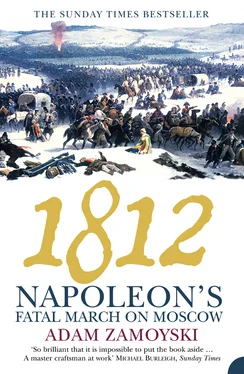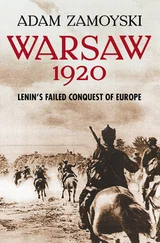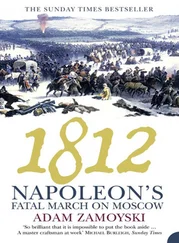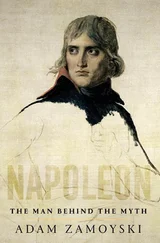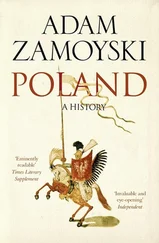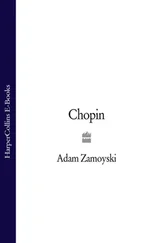The creation of the Grand Duchy of Warsaw had also raised the spectre of another threat to Russia through the introduction of the Code Napoléon . This transformed social relationships and would lead to the full emancipation of the peasants. The landowners of Russia, 95 per cent of whose population were serfs, could not look on such a neighbour with equanimity.
The Poles, whether they were citizens of the Grand Duchy or not, certainly saw it as the nucleus of a restored Kingdom of Poland, and there was much dreaming and plotting in provinces still under Russian or Austrian rule. When Austria went to war with France in 1809, one of her armies had seized Warsaw but had then been obliged to fall back, pursued by the Poles, who proceeded to march into Galicia, a part of Poland annexed by Austria.
In the peace settlement, Napoleon had allowed the Poles to incorporate a small part of the liberated territory into the Grand Duchy of Warsaw. This alarmed the Austrians, who feared they might in time have to give up the rest, and annoyed the Poles, who felt they should have been allowed to take back the whole area they had liberated. They were, moreover, outraged by the fact that Napoleon had also ceded a piece of it to Russia as a sweetener.
But the Russians were not mollified. Caulaincourt reported that everyone in St Petersburg, from the Tsar down, was adamant that no part of Galicia should be added to the Grand Duchy, as this would set a dangerous precedent. ‘All the news coming from Moscow and the provinces confirms that this agitation is universal: it is necessary to take up arms and die, they are saying, rather than suffer the reunification of Galicia with the Grand Duchy,’ he wrote. And the issue transcended loyalty to the Tsar, whom many did not trust. * ‘There is not the slightest restraint in the allegations being made against the Emperor Alexander; there is open talk of assassinating him,’ reported Caulaincourt. ‘I have not seen minds so agitated since my arrival in Petersburg.’ 2
Napoleon never had any intention of restoring Poland – all his statements to the contrary date from later, when he was trying to keep the Poles on his side or to pluck straws of self-justification from the wind. He therefore proposed to Alexander that they sign a joint convention binding themselves not to encourage the Poles in their dreams. As a sign of his discouragement of Polish aspirations, he sent the best units of the army of the Grand Duchy, the Legion of the Vistula, to fight in Spain.
But Alexander produced a draft convention which would excise the words ‘Poland’ and ‘Poles’ from all official correspondence, ban the wearing of Polish decorations and forbid the use of Polish emblems in the Grand Duchy. He wanted Napoleon to pledge that he would never allow the restoration of Poland, and that he would take up arms against the Poles if they attempted it. Napoleon replied that while he could declare his opposition to such a revival, he would not and could not undertake to hinder it. The wording suggested by Russia was nonsensical, as it bound France to pledges she would be in no position to carry out. He pointed out that he could have re-established Poland if he had wished to in 1807, and added the whole of Galicia to the Grand Duchy in 1809, but had not done so because he had no intention of doing so. Nevertheless, tens of thousands of Poles had fought loyally alongside the French for over a decade, inspired by their hopes of a free motherland and by France’s sympathy to their cause. To sign the text suggested by Russia would ‘compromise the honour and dignity of France’, as Napoleon put it to Champagny. 3
Alexander continued to insist on his draft rather than the more general one proposed by Napoleon. Hoping to put pressure on the Emperor to acquiesce, he dropped hints that he might not find it so easy to keep up the blockade against Britain without wholehearted support from him. But his increasingly urgent insistence with regard to the convention, as well as the suspicions he voiced, revealed how little he trusted Napoleon, who began to wonder what lay behind it all. ‘One cannot conceive what aim Russia might have in mind in refusing a version which accords her everything she wants in favour of one which is dogmatic, irregular, contrary to common prudence, and which, ultimately, the Emperor cannot subscribe to without dishonouring himself,’ he wrote to Champagny on 24 April 1810. 4
On 30 June, when Champagny brought a communication from St Petersburg with a list of complaints and a renewed demand that he sign the Russian draft of the convention, Napoleon lost his temper. He summoned the Russian ambassador, Prince Kurakin. ‘What does Russia mean by such language?’ he demanded. ‘Does she want war? Why these continual complaints? Why these insulting suspicions? If I had wished to restore Poland, I would have said so and would not have withdrawn my troops from Germany. Is Russia trying to prepare me for her defection? I will be at war with her the day she makes peace with England.’ He then dictated a letter to Caulaincourt in St Petersburg telling him that if Russia was going to start blackmailing him and using the Polish question as an excuse to seek a rapprochement with Britain, there would be war. 5
It was the first time Napoleon had mentioned war, and it was a remark thrown out in the heat of the moment. The last thing he wanted was war with Russia. Russia, on the other hand, was increasingly looking forward to one. Russian society had been hostile to the French alliance from the start, and attitudes had only hardened over the years. The reasons were cultural and psychological rather than strategic.
Russia was a young society, and its upper echelons consisted of a rich social and ethnic mix. At court, in the administration and in the army old boyar families jostled with a new aristocracy whose origins lay in the political instability and culture of favouritism of the past century, which had produced grand aristocratic families such as the Razumovskys and the Orlovs, only a couple of generations from the servants’ quarters or the barrack room. To this, conquest and annexations had added Germanic Baltic barons, Polish nobles, Georgian and Balkan princes, while the need for talent in the rapidly expanding state had sucked in immigrants from many lands. It was a mobile society, highly dynamic, but also beset by cultural insecurity.
Over the past hundred years educated Russians had drawn heavily on French culture. To them more than to any other European society, France was the fount of civilisation. The nobility were brought up by French tutors on French literature, and spoke French amongst themselves. * Few of them had any more Russian than was needed to give orders to servants. French books were as widely read in Moscow and St Petersburg as in Paris. Fluency in French was mandatory for anyone wishing to make a career in the army or the administration. The only senior officer in the Russian army in 1812 not to speak French fluently was General Miloradovich, who was of Serbian extraction, and Alexander prided himself on the fact that his French was better than Napoleon’s. 6
Underpinning this francocentrism was a huge colony of teachers, artists, musicians, tailors, dressmakers, cabinetmakers, jewellers, dancing masters, hairdressers, cooks and servants, some of whose parents or grandparents had settled in Russia and established dynasties. From the beginning of the revolution in France they were joined by thousands of French émigrés, some from the highest aristocracy, many of whom took service in the Russian army. †
Knowledge of French meant much more than just a linguistic skill. It implied familiarity with the literature of the past hundred years and with the ideas of the Enlightenment, as well as with all the pseudo-spiritual and occult fads of the day. Freemasonry had spread through the upper reaches of Russian society, and its more spiritual offshoots, such as Martinism, ‡were embraced with enthusiasm. Alexander himself had close relations with many Masons, and even founded a lodge consisting of himself, Rodion Kochelev, a follower of Saint-Martin and Swedenborg, and Aleksandr Nikolaevich Galitzine (whom he had also appointed Procurator of the Holy Synod). This seemingly paradoxical situation was symptomatic of a wider malaise, for the dependence on French culture sat uneasily with a visceral attachment to traditional Orthodox values. And while French culture ruled and society spoke French, dressed French and aped the French in everything, there had always been a concurrent resentment of France herself. The revolution had magnified this resentment, and the events of 1805–1807 had turned it into something of a national movement.
Читать дальше
